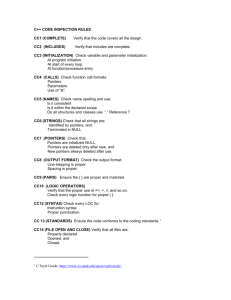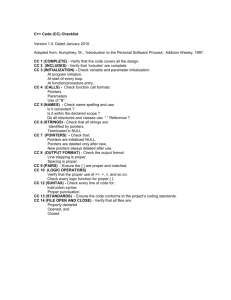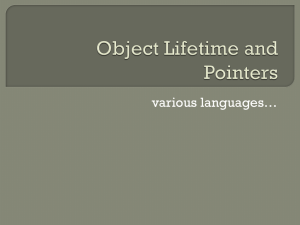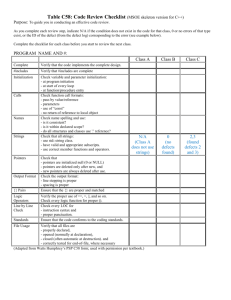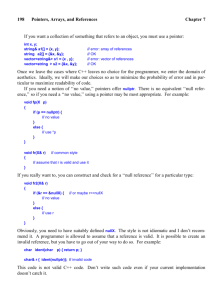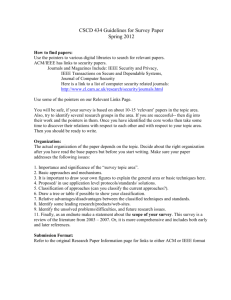Pointers
advertisement
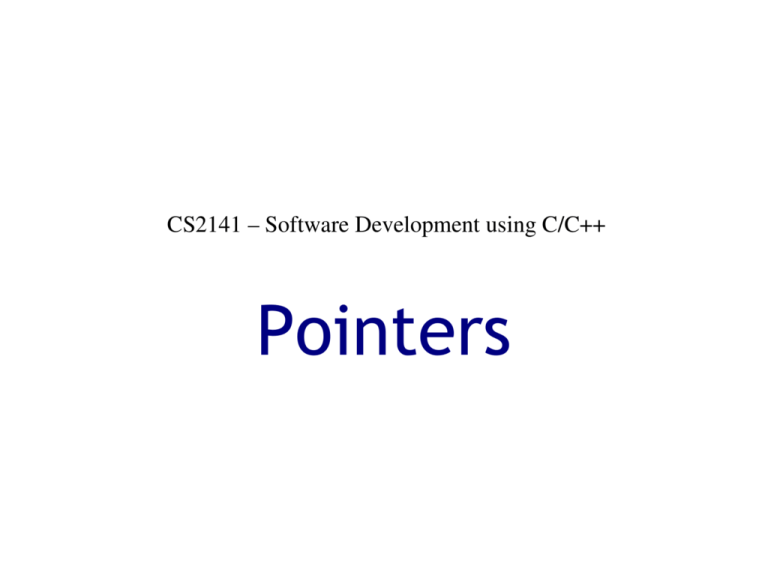
CS2141 – Software Development using C/C++
Pointers
What is a pointer?
●
●
A pointer is simply a variable that stores the
memory address of some other value
All pointers on a given machine are the same size
since all memory addresses are the same size
int i = 147;
int * p = &i;
Pointers
2
Pointers in Java
●
Does Java have pointers? Recall the Java program
from before:
public class TestClass {
public int value;
public static void main( String[] args ) {
TestClass obj1 = new TestClass( );
TestClass obj2;
obj1.value = 12;
obj2 = obj1;
obj1.value = 18;
System.out.println( “obj1 value “ + obj1.value );
System.out.println( “obj2 value “ + obj2.value );
}
}
Pointers
3
Pointers in Java cont.
●
And the C++ program from before:
class TestClass {
public:
int value;
};
int main( ) {
TestClass obj1;
TestClass obj2;
obj1.value = 12;
obj2 = obj1;
obj1.value = 18;
cout << “obj1 value “ << obj1.value << endl;
cout << “obj2 value “ << obj2.value << endl;
}
Pointers
4
Pointers in Java cont.
●
Remember the results:
Java (object references)
C++ (object values)
Pointers
5
Pointers in Java cont.
●
Now consider this C++ program:
class TestClass {
public:
int value;
};
int main( ) {
TestClass * obj1 = new TestClass( );
TestClass * obj2;
obj1->value = 12;
obj2 = obj1;
obj1->value = 18;
cout << “obj1 value “ << obj1->value << endl;
cout << “obj2 value “ << obj2->value << endl;
}
Pointers
6
Pointers in Java cont.
●
When run, it works like the Java version, with obj1
and obj2 pointing at the same object:
So does Java have pointers?
Pointers
7
Declaring a Pointer
●
A pointer is declared using the data type of the value
it will point at and an asterisk:
float * fp;
●
// pointer to a float
A null pointer is a pointer value that does not refer
to any memory location
●
●
A pointer can be made null by assigning zero to it:
char * s = 0;
Since a pointer is either null (zero) or non-null (not zero),
it can be used as a boolean like an integer
Pointers
8
Assigning Values to Pointers
●
Three ways to assign pointers:
●
Using new, which returns a pointer:
TestClass * obj1 = new TestClass( );
●
Copying an existing pointer:
TestClass * obj2 = obj1;
●
The address-of operator (&) is used to get the memory
address of an existing value:
TestClass obj3;
obj2 = &obj3;
Pointers
9
Dereferencing a Pointer
●
A pointer can be dereferenced to access the value it
points at. There are several ways to do this:
●
The * operator – if a variable p is holding the address of a
value, then *p is the value pointed at by p
// Reserve space for a new
// integer and have p point
// at that space
int * p = new int;
// Set the value of the
// integer p points at to 5
*p = 5;
Pointers
10
Dereferencing a Pointer cont.
●
A pointer to a class can combine dereferencing
and member field access using the pointer
operator ->.
// Declare a pointer to
// a TestClass object
TestClass * obj;
// Allocate a TestClass
// object and set obj
// to point at it
obj = new TestClass( );
// Set the value field
// of the TestClass object
// obj points at to 934
Pointers
obj->value = 934;
11
Dereferencing a Pointer cont.
●
A pointer to an array can be subscripted to access
array elements (more on pointers and arrays
later):
float * vals;
vals = new float[15];
vals[6] = -27.8;
●
An integer can be added to or subtracted from a
pointer to yield a new pointer:
float * vals2 = vals + 10;
Pointers
12
Pointer Operations
●
Pointers to primitive data types should only be used in two
operations; comparing for equality (or inequality) and
dereferencing:
int * p = new
int * q = new
if( p == q )
*p = 5;
else
*q = 6;
●
int;
int;
// Decide if p and q point
// to the same location
// if( p != q )
Other operations are possible, but they don't make much
sense:
if( p < q ) ...
// What??
Pointers
13
Reassigning Pointers
●
The location a pointer points at can be changed with
another assignment:
int
int
int
p =
number1 = 7;
number2 = 18;
* p;
&number1;
...
p = &number2;
Pointers
14
Using Pointers
●
Dereferenced values can be used in any operation
(including math):
*p = *p + number1;
●
Modifying a pointer is not the same as modifying
the value it points at:
p = &number1; // Modifying the pointer.
*p = 42;
// Modifying the value
// p points at.
Pointers
15
Pointers and Arrays
●
Pointers and arrays are very closely related
●
Any pointer can be subscripted
●
An array variable can be assumed to be a pointer
int values[100];
int * cows = values;
// These are the same:
cows[4] = 12;
values[4] = 12;
*(cows + 4) = 12;
*(values + 4) = 12;
Pointers
16
Pointers and Arrays cont.
●
Subscripts are never checked for range.
●
The following subscripts are all legal (the compiler will
not complain), but incorrect:
cows[250] = 83;
values[-27] = 42;
TestClass * obj1 = new TestClass( );
obj1[5].value = 8;
●
Rarely is there a need for an out of range subscript.
●
If it happens, it is usually a programming error.
●
The same thing can happen with pointer arithmetic.
Pointers
17
Pointer to Pointers
●
●
Multiple dereferences of the same variable are
possible and sometimes convenient.
An example is a multi-dimensional array:
int i;
int ** pigs = new int*[4];
for( i = 0; i < 4; i++ )
pigs[i] = new int[2];
pigs[2][0] = 23;
Pointers
18
Global Pointers to Local Variables
●
Global pointers to local variables are a bad idea:
int * ptr;
// A global pointer
void set( ) {
int number;
number = 8;
ptr = &number;
}
void use( ) {
double value;
value = 30;
value += *ptr;
}
// Assign a value.
// Use the value
// ptr points at.
Pointers
19
Global Pointers to Local Variables
cont.
●
The code will probably fail:
●
●
●
When set is run, ptr is set to point at
the local variable number.
Since it is a local variable, number is
destroyed when set returns, but ptr
still points at the memory location
where number was.
use then uses the value ptr points at,
but that value will very likely not be the
one the programmer expected.
Pointers
20
Pointers and const
●
A pointer to a constant:
int number = 15;
const int * ptr1 = &number;
*ptr1 = 25;
// not allowed
●
A constant pointer:
int * const ptr2 = &number;
*ptr2 = 32;
// allowed
ptr2 = ptr1;
// not allowed
●
A constant pointer to a constant:
const int * const ptr3 = &number;
Pointers
21
void pointers
●
A void * pointer can point to anything
●
Can be used much like the Object type in Java
●
Any pointer can be converted into a void * pointer
●
Converting void * pointer back requires a cast:
double real;
double * rptr = &real;
void * gptr = rptr;
double * rptr2;
rptr2 = (double *)gptr;
Pointers
// Converting back
22
Function Pointers
●
A pointer can also point to a function:
int next_n( int n ) {
return n + 1;
}
// Declaring a function pointer fun_ptr
int (*fun_ptr)( int );
// Assigning it to point to next n
fun_ptr = &next_n;
// Or
fun_ptr = next_n;
Pointers
23
Function Pointers cont.
●
Using fun_ptr:
int x;
// Using fun_ptr
x = (*fun_ptr)( x );
// Or
x = fun_ptr( x );
●
Do not use pointers to member functions.
●
The syntax is extremely obscure.
●
Such pointers are very rarely needed.
Pointers
24
